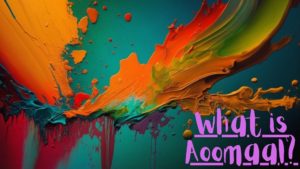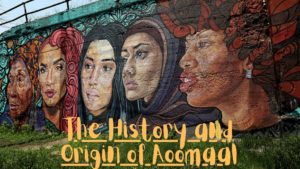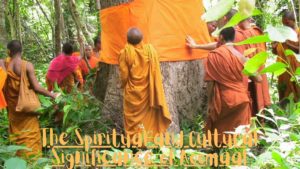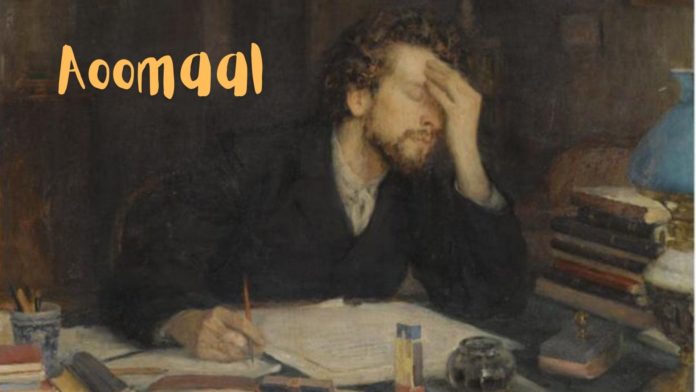Have you ever heard of the concept of Aoomaal and wondered what it really means? If so, you’re not alone. Aoomaal is a term that holds great significance in various cultures and spiritual practices around the world. In this blog post, we will delve into the meaning and importance of Aoomaal, exploring its origins, cultural significance, and how it can impact our lives. So sit back, relax, and let’s unravel the mysteries of Aoomaal together!
What is Aoomaal?

Aoomaal is a term that has gained popularity in recent years, especially in the world of spirituality and personal growth. In simple terms, Aoomaal can be defined as the energy or power within us that drives our actions and influences our thoughts and emotions. This concept originated from ancient Eastern philosophies such as Hinduism, Buddhism, and Taoism.
The word “Aoomaal” is derived from the Sanskrit word “Aum,” which represents the primordial sound of creation. It is believed to be the first sound heard at the beginning of time and symbolizes the ultimate reality or consciousness. The suffix “-maal” means “treasure,” so when combined, the term Aoomaal translates to “the treasure of Aum.”
In essence, Aoomaal refers to the innate potential within each individual to manifest their desires and achieve their goals. It encompasses all aspects of a person’s being – physical, mental, emotional, and spiritual. It is not just limited to one’s skills or talents but also includes their inner strength, determination, creativity, intuition, and connection with universal consciousness.
Understanding Aoomaal requires an understanding of its role in shaping our lives. Our thoughts are like magnets; they attract similar energies into our lives. If we have positive thoughts filled with hope and optimism, we will attract positive experiences into our lives. On the other hand, negative thoughts rooted in fear or doubt will bring negative outcomes.
This is where Aoomaal comes into play – it acts as a driving force behind our thoughts and influences them towards positive or negative directions. When we tap into this powerful energy within us through practices like meditation or mindfulness techniques, we can control our thought patterns better.
Another crucial aspect of Aoomaal is its connection with universal consciousness or divine energy. This belief aligns with quantum physics theories that state everything in this universe is interconnected through an underlying field of energy.
By connecting with Aoomaal, we are also connecting with the universal consciousness, which can help us manifest our desires and bring about meaningful transformations in our lives. This connection with the divine energy also brings a sense of purpose, inner peace, and harmony.
Aoomaal is not just a concept but a way of life that emphasizes harnessing our inner power to create positive changes in ourselves and the world around us. It requires self-awareness, mindfulness, and a deep understanding of our true potential. By incorporating Aoomaal into our daily lives, we can unlock the treasure within us and experience a fulfilling and purposeful existence.
The History and Origin of Aoomaal

The history and origin of Aoomaal dates back to ancient times, when the concept of spirituality and energy was deeply rooted in many cultures around the world. Its roots can be traced back to various indigenous traditions and religious practices that emphasized the connection between mind, body, and spirit.
One of the earliest mentions of Aoomaal can be found in Hinduism, where it is known as “prana” or “life force.” In this tradition, prana is believed to flow through channels called nadis and can be harnessed through practices such as yoga, meditation, and breathwork to achieve physical, mental, and spiritual balance.
In traditional Chinese medicine, Aoomaal is referred to as “qi” or “chi,” which translates to “vital energy.” The concept of qi is based on the principle that all living beings possess a vital energy that flows throughout the body. According to this belief, imbalances or blockages in qi can lead to illness or disease. Practices like acupuncture and tai chi aim to balance qi for optimal health and well-being.
Aoomaal also has its origins in ancient Egyptian culture with its own term for life force – “ka.” Egyptians believed that ka was an essential part of a person’s being and could continue after death if preserved properly. They used rituals such as mummification to ensure the preservation of ka for eternity.
In Buddhism, Aoomaal takes on the name “prana” or “vayu,” meaning wind or breath. It is considered one of the five elements (along with earth, water, fire, and space) that make up everything in existence. Buddhist teachings emphasize harnessing prana through mindfulness practices like meditation to achieve inner peace and enlightenment.
Over time, these beliefs about life force energy have evolved into various forms across different cultures. However, they all share a common understanding that there is an unseen energy or vitality within us that is essential for our overall well-being.
In modern times, the concept of Aoomaal has gained more mainstream recognition through practices like Reiki, which focuses on channeling and balancing life force energy to promote healing and relaxation. It has also been incorporated into holistic health approaches such as Ayurveda and traditional Chinese medicine.
Aoomaal has a rich history and diverse origins that have shaped its understanding today. Whether through ancient traditions or modern practices, the concept of life force energy continues to play an important role in promoting balance and harmony within ourselves and the world around us.
The Spiritual and Cultural Significance of Aoomaal

The word “Aoomaal” holds great spiritual and cultural significance for many cultures around the world. It is a term that encompasses various meanings, beliefs, and practices, making it a complex concept to fully understand. In this section, we will dive deeper into the spiritual and cultural significance of Aoomaal, exploring its origins and how it is perceived in different cultures.
In its essence, Aoomaal refers to the energy or life force that flows through all living beings. This energy is believed to be present in every aspect of creation, from plants and animals to humans and beyond. It is seen as a vital force that sustains life and connects us all on a deeper level.
One of the earliest mentions of Aoomaal can be traced back to ancient Indian scriptures such as the Upanishads and Vedas. Here, it is referred to as “prana,” which translates to “life force” or “vital energy.” Similarly, in Chinese culture, this energy is known as “chi,” while in Japanese culture it is called “ki.” These are just some examples of how Aoomaal has been recognized across different civilizations throughout history.
For many cultures, Aoomaal is closely linked with spirituality and religion. In Hinduism and Buddhism, for instance, it is believed that practicing meditation can help individuals tap into their inner Aoomaal and achieve enlightenment. Similarly, in Taoism and Confucianism, balancing one’s chi or ki through practices like tai chi or qigong can lead to better physical health and spiritual growth.
Moreover, certain rituals or ceremonies are performed by indigenous communities around the world to honor the spirit of Aoomaal. For example, Native American tribes perform smudging rituals using herbs like sage or cedar to cleanse themselves spiritually by connecting with nature’s life force.
Apart from its spiritual significance, Aoomaal also plays a crucial role in traditional healing practices such as Ayurveda and traditional Chinese medicine. It is believed that imbalances in Aoomaal can lead to physical and mental illnesses, and restoring its flow can help heal the body and mind.
In addition to its spiritual and healing significance, Aoomaal also holds cultural importance. It is often portrayed in art, literature, and music as a symbol of life, vitality, and interconnectedness. Many cultures have unique symbols or depictions of Aoomaal, such as the yin-yang symbol in Chinese culture or the chakras in Hinduism.
Aoomaal is a concept that goes beyond just an energy force; it encompasses deep spiritual beliefs, cultural traditions, and holistic approaches to well-being. Its significance has stood the test of time and continues to play a vital role in various aspects of human life. Understanding this concept can help us connect with ourselves on a deeper level and appreciate the beauty of life’s interconnectedness.
How Aoomaal is Practiced in Different Cultures

Aoomaal, also known as “the evil eye,” is a widely recognized concept across different cultures and religions. It is believed to be a curse or negative energy that can be unintentionally caused by envy or admiration towards someone. This belief has been around for centuries and continues to play a significant role in the daily lives of many people.
While Aoomaal has its roots in ancient Middle Eastern cultures, it has spread throughout the world and adapted to various customs and beliefs. In this section, we will explore how Aoomaal is practiced in different cultures and how it differs from one another.
In Mediterranean countries such as Greece, Turkey, and Italy, Aoomaal is deeply ingrained in their culture. The locals believe that the curse can cause harm to individuals, animals, crops, or even objects. To protect themselves from the negative effects of Aoomaal, they wear “Nazar” charms – blue glass beads with an eye symbol on them. These charms are believed to deflect evil eye glares away from the wearer.
In South Asia, particularly India and Pakistan, Aoomaal is referred to as “nazar lagna.” People here believe that it can affect anyone regardless of their age or social status. To prevent the evil eye’s influence on newborns or young children who are most vulnerable to its effects, mothers often tie black threads around their wrists or necks as a symbolic protection against it.
In Latin America, particularly Mexico and Brazil, Aoomaal is known as “mal de ojo.” Superstitions surrounding this curse are prevalent among these people who believe in warding off its effects through rituals involving holy water blessings and incense burning ceremonies.
The practice of protecting oneself from Aoomaal also exists in Western cultures but may differ slightly compared to other regions’ more traditional methods. Some people might hang dreamcatchers above their beds or wear Hamsa hand amulets for good luck and protection against the evil eye.
In Islamic cultures, Aoomaal is deeply rooted in their religious beliefs. The Prophet Muhammad himself frequently spoke about the existence of evil eye and its potential harm. To protect themselves from it, Muslims recite specific prayers, known as Ruqyah, seeking Allah’s protection and blessings.
It is fascinating to see how Aoomaal has transcended borders and integrated into different cultures’ belief systems. While there are slight variations in its practice, one thing remains constant – the fear and desire to protect oneself from its effects.
Understanding Aoomaal’s cultural significance provides insight into the diverse beliefs and practices around this concept worldwide. Whether through amulets or rituals, people across cultures have found ways to shield themselves from the negative energy of the evil eye.
Rituals Associated with Aoomaal

Rituals are an integral part of Aoomaal, and they play a significant role in the practice and understanding of this spiritual tradition. These rituals are believed to connect individuals with the divine energy and help them attain a sense of balance, peace, and harmony in their lives.
One of the most important rituals associated with Aoomaal is meditation. This practice involves quieting the mind and focusing on one’s breath or a specific mantra. Through meditation, practitioners aim to achieve a state of deep relaxation and heightened awareness. It is believed that by quieting the mind, one can tap into their inner wisdom and connect with the universal consciousness.
Another essential ritual in Aoomaal is prayer. Prayer is seen as a way to communicate with the divine or higher power. In Aoomaal, prayers are not limited to reciting specific words or phrases; instead, it is viewed as an act of devotion and surrender to the will of the universe. Prayers may be said individually or collectively during gatherings or ceremonies.
Ceremonies are also an essential aspect of Aoomaal rituals. These ceremonies often involve chanting, dancing, singing, drumming, or other forms of expression that facilitate a connection with spirit energies. Ceremonies may be held for various purposes such as healing, gratitude, or seeking guidance from ancestors or spirit guides.
Offerings are another significant ritual in Aoomaal. Offerings can take many forms such as food items, flowers, incense sticks, candles, etc., depending on individual beliefs and practices. These offerings are made as symbols of gratitude towards the divine energy for blessings received or seeking assistance for specific needs.
Purification rituals also hold great importance in Aoomaal traditions. These rituals aim to cleanse negative energies from individuals or spaces through various means such as smudging (burning herbs), bathing in sacred waters like rivers or oceans, using sound vibrations (e.g., bells or singing bowls), etc. These rituals are believed to create a more conducive environment for spiritual growth and connection.
Celebrations and festivals are an integral part of Aoomaal rituals. These events often mark significant dates in the lunar or solar calendar that hold spiritual significance. They may involve feasting, dancing, chanting, and other forms of celebration to honor the divine energy and express gratitude for its presence in one’s life.
Aoomaal emphasizes the importance of rituals as a means to connect with the spiritual realm and attain inner peace. These practices serve as reminders of our interconnectedness with all beings and help us stay aligned with the natural rhythms of the universe. Through rituals, individuals can deepen their understanding of Aoomaal and enhance their spiritual journey towards enlightenment.
Misconceptions and Stereotypes Surrounding Aoomaal

Misconceptions and stereotypes surrounding Aoomaal are prevalent in many societies, often leading to negative attitudes and discrimination towards individuals who identify as Aoomaal. These misconceptions and stereotypes stem from a lack of understanding and awareness about the true meaning and importance of Aoomaal.
One common misconception is that Aoomaal is simply a label for someone who does not conform to traditional gender norms. This oversimplification ignores the complexities of Aoomaal identity and diminishes its significance. In reality, Aoomaal encompasses a wide range of identities, including but not limited to non-binary, genderfluid, agender, and genderqueer. Each individual’s experience with their own identity is unique, shaped by their personal journey and cultural context.
Another harmful stereotype associated with Aoomaal is that it is a choice or “trend,” rather than an inherent aspect of one’s identity. This belief invalidates the experiences of those who identify as Aoomaal by implying that they are going against nature or seeking attention. However, research has shown that gender identity develops at a young age and cannot be changed or chosen arbitrarily.
Furthermore, there is a misconception that all individuals who identify as Aoomaal are physically transitioning or have undergone surgery to align their bodies with their gender identity. While this may be true for some individuals within the community, it is not representative of all people who identify as Aoomaal. Gender expression and physical transition are personal choices and should not be equated with one’s identification as Aoomaal.
Stereotypes also exist about the appearance or presentation of those who identify as Aoomaal. Many people assume that all individuals within this community must look a certain way or adhere to specific fashion trends to be considered valid. This narrow-minded thinking perpetuates harmful beauty standards and ignores the diversity within the community.
It’s important to note that these misconceptions and stereotypes surrounding Aommaal can lead to discrimination and violence against individuals within the community. This includes denial of healthcare, employment opportunities, and even basic human rights.
It’s crucial to challenge and debunk these misconceptions and stereotypes by educating ourselves about Aoomaal identity. We must understand that Aoomaal is a valid and integral part of the gender spectrum, deserving of respect and recognition. By promoting acceptance and inclusivity, we can create a more welcoming society for all individuals, regardless of their gender identity.
Benefits of Incorporating Aoomaal into Daily Life

There are numerous benefits to incorporating Aoomaal into your daily life. This ancient practice has been around for centuries and has proven to have a positive impact on both physical and mental well-being. In this section, we will explore the various ways in which Aoomaal can improve your overall quality of life.
1. Promotes Relaxation and Reduces Stress: Aoomaal is deeply rooted in mindfulness and meditation techniques, making it an ideal practice for reducing stress and promoting relaxation. By focusing on breath control and being present in the moment, Aoomaal helps to calm the mind and bring a sense of inner peace.
2. Improved Physical Health: Regularly practicing Aoomaal can also have a positive impact on your physical health. The controlled breathing exercises help to enhance lung function, increase oxygen supply to the body, and improve blood circulation. This can lead to improved cardiovascular health, decreased blood pressure, and reduced risk of chronic diseases such as heart disease.
3. Mental Clarity and Focus: As mentioned earlier, Aoomaal involves focusing on the present moment through breath control. This helps to clear the mind of distractions and promote mental clarity and focus. By regularly practicing Aoo maal, you may find that you are better able to concentrate on tasks at hand, make decisions more easily, and stay focused for longer periods.
4. Boosts Immune System: Studies have shown that regular practice of mindful meditation techniques like those used in Aoomaal can boost the immune system by increasing levels of antibodies in the body that fight off harmful viruses and bacteria.
5. Increases Self-Awareness: Through its emphasis on self-reflection, introspection, and gratitude towards oneself, Aoomaal promotes self-awareness -a key component of personal growth and development. By becoming more aware of our thoughts, emotions, behaviors,and reactions through regular practice ,we gain a better understanding of ourselves which can lead to improving our relationships with others and overall well-being.
6. Cultivates Positive Mindset: Aoomaal teaches us to let go of negative thoughts, emotions, and patterns that are holding us back from reaching our full potential. By practicing daily, we learn to cultivate a positive mindset and approach life with more positivity, gratitude, and optimism.
Incorporating Aoomaal into your daily routine can have numerous benefits for both your physical and mental well-being. It is a simple yet powerful practice that can bring about positive changes in all aspects of your life. By taking the time to connect with yourself through mindful meditation techniques, you can experience increased peace of mind, improved health, and a more meaningful life overall.
Ways to Learn More About and Practice Aoomaal

There are several ways to learn more about and practice Aoomaal, the spiritual concept that holds immense significance in many cultures and religions. In this section, we will explore some effective ways to deepen your understanding of Aoo maal and incorporate it into your daily life.
1. Study the teachings of Aoomaal: The first step towards learning more about Aoomaal is to familiarize yourself with its teachings. You can read books, watch lectures or listen to podcasts by spiritual leaders who have delved deep into the concept of Aoomaal. These resources will provide valuable insights into the meaning, purpose and practices associated with this powerful force.
2. Seek guidance from a mentor or teacher: Another way to understand Aoomaal is by seeking guidance from a mentor or teacher who has expertise in this area. They can help you navigate through complex concepts and provide personalized advice on how you can incorporate Aoomaal into your daily life. Having a mentor also allows for a deeper connection with the teachings as they can offer practical examples and experiences.
3. Reflect and meditate: Reflection and meditation are powerful tools for understanding any spiritual concept, including Aoomaal. By taking time out for quiet contemplation, you open yourself up to receiving wisdom and clarity from within. Pay attention to your thoughts, feelings and sensations during these sessions as they may hold valuable insights into the workings of Aomaal.
4. Practice mindfulness: Mindfulness is all about being present in each moment without judgment or distraction. By incorporating mindfulness techniques such as deep breathing, body scan exercises or mindful walking into your daily routine, you can develop a deeper connection with yourself and with Aoomaal.
5. Engage in selfless service (Seva): Seva refers to selfless service performed without any expectations or desires for personal gain. This practice helps us cultivate compassion, humility and gratitude – all essential qualities for understanding and practicing Aoomaal.
6. Connect with nature: Nature is a powerful source of Aoomaal and connecting with it can help us gain a deeper understanding of this force. Take walks in nature, spend time in gardens or near bodies of water, and practice activities such as gardening or bird watching to connect with the natural world.
Learning more about and practicing Aoo maal requires a combination of study, guidance, self-reflection and practical application. By incorporating these ways into your life, you can deepen your understanding and experience the transformative power of Aoomaal.
Conclusion: Embracing the Power of aoomaal
It is evident that Aoomaal holds immense significance in our lives. It is not just a word or a concept, but rather, a way of life. By understanding its meaning and embracing its power, we can unlock our true potential and lead fulfilling lives.
One of the key takeaways from understanding Aoomaal is the importance of self-awareness. By being aware of our thoughts, feelings, and actions, we can better understand ourselves and make conscious choices that align with our values and goals. This leads to a sense of purpose and direction in life.
Moreover, Aoomaal teaches us about personal responsibility. We are all responsible for how we respond to situations and how we shape our own reality. Instead of blaming external factors for our circumstances, we must take ownership of our choices and strive towards creating positive change in ourselves.
Another crucial aspect emphasized by Aoo maal is the power of positivity. By focusing on gratitude and maintaining a positive mindset, we can attract more abundance into our lives. This does not mean ignoring negative emotions or experiences but rather acknowledging them while also finding ways to shift towards a more optimistic outlook.
Furthermore, embracing the power of Aoomaal requires us to let go of fear-based thinking and embrace trust instead. Fear often holds us back from taking risks or pursuing our dreams; however, trusting in ourselves and the universe can open up endless possibilities for growth and success.
Incorporating Aoomaal into one’s life means constantly striving for improvement. It encourages us to continuously learn new things, challenge ourselves, and evolve as individuals. This leads to personal development as well as contributing positively to society.
In today’s fast-paced world where material possessions are often valued over inner peace and fulfillment, understanding Aoo maal becomes even more critical. It reminds us that true happiness comes from within rather than external factors.
Get the latest updates on redandwhitemagz.net

